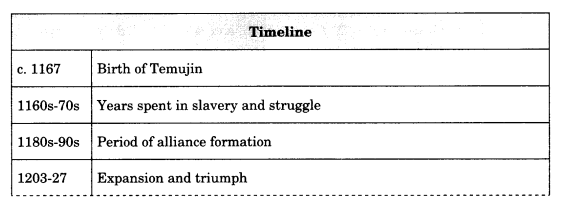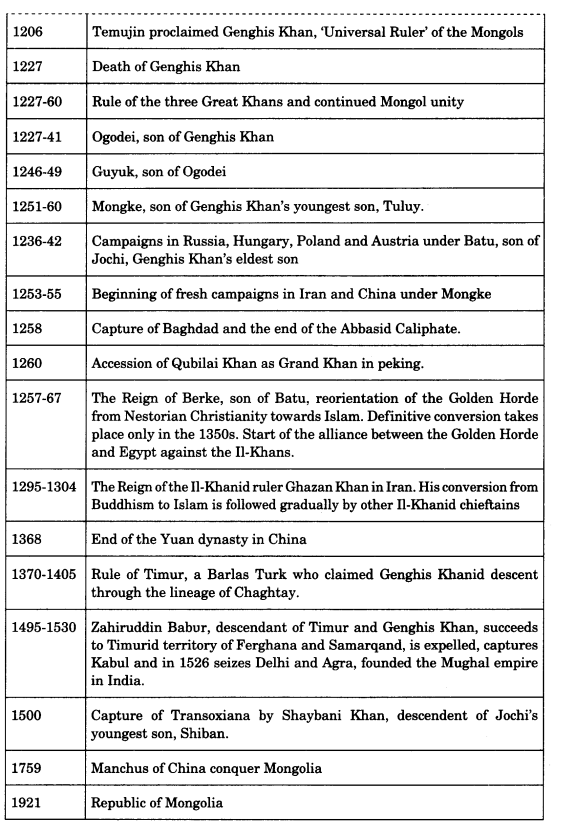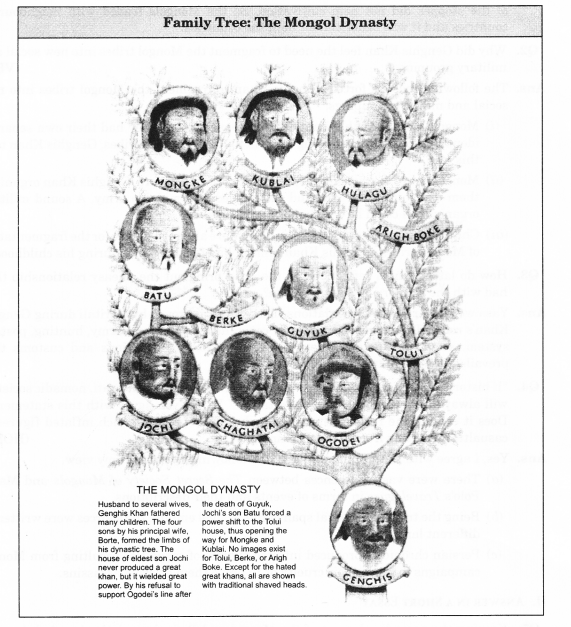Class 11 History Notes Chapter 5 Nomadic Empires
- Mongols were the nomadic tribes who inhabited in central Asia.
- Mongols were divided into many groups. These groups were constantly engaged in wars with each other.
- Mongol society was patriarchal in nature. Birth of a son was considered to be the sign of prosperity.
- Genghis Khan played an outstanding role in the establishment of Nomadic Empire.
- Genghis Khan was born in 1162 CE. His childhood name was Temujin. His father Yesugei was Kiyat’s tribe chief. Oelun-eke was the name of his mother.
- Genghis Khan faced many problems in his childhood as his father was murdered by a tribe.
- With the help of some persons like Jamuqa, Boghuruchu, Tughril Khan, etc. he successfully defeated some powerful tribes.
- Quriltai bestowed upon Temujin, the title of Genghis Khan in 1206. He ruled upto 1227 CE.
- During his reign, Genghis Khan conquered the region of northern China and Qara Khita.
- Genghis Khan brought some changes in the area under his rule. In the history of Mongol, Genghis Khan is known as a national hero.
- The nomadic people were mainly non-vegetarians. They ate the meat of different animals like sheep, goat, etc. The main diet of the nomadic people was meat and milk.
- Silk clothes were imported from China, while woollen clothes were prepared by themselves. The rich used to wear expensive clothes while the dress of common people was very simple.
- Trade was also in practice and carried out with neighbouring countries.
- In 1209, Genghis Khan defeated Hsi, Hsia of China.
- Mongols occupied Otsar, Bukhara, Samarqand, Maru, Herat, Nishapur and Balkh between 1219 to 1222 CE.
- Genghis Khan organised his forces as per the old steppe system of decimal units. The important institution of Mongolian state was the army.
- Strict discipline was maintained in the army. The authority of the king could not be challenged.
- Civil system was based on the Ulus system.
- Yam was the military rank enjoyed by Mongols.
- Ogodei, Guyuk and Mongke were the successors of the Genghis Khan.
- Qubilai Khan was the founder of Yuan dynasty. He founded this dynasty in 1260 and ruled till 1294.
- The steppe inhabitants had no literature of their own. Most of our knowledge regarding the nomadic society was mainly derived from the chronicles, travelogues and documents produced by cities based literature.
- We find most significant information regarding the expansion of transcendental Mongol empire from Chinese, Mongolian, Persian, Arabic, Italian, Latin, French and Russian sources.
- Two most outstanding sources of Mongols are Igor de Rachewiltz’s ‘The Secret History of Mongol’ and ‘the Travelogues of Marco Polo’.
Important Terms:
- Barbarian: A person who is uncultured and behaves in a rough or cruel manner and is ignorant of good taste.
- Kiyat: A group of families related to the Boijigid clan
- Anda: Real or blood brother
- Confederacy: A union of states, groups of people or political with the same aim.
- Tuman: A group of ten thousand soldiers
- Noyan: Captain of army unit
- Naukar: Bonded man, a rank to common but intimate people
- Ulus: Conquered but not fixed territory
- Tama: Military contingents
- Quriltais: An assembly of chieftains
- Qubcur: A tax imposed on nomads for communication facility provided to them.
- Yam: Courier system
- Qanat: Underground canal in the arid plateau in Iran
- Paiza: A pass or permit to move from one place to another.
- Bjg:A tax imposed on traders
- Yasa: A code of law promulgated by Genghis Khan in 1206.


